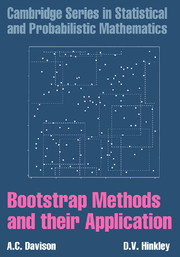Book contents
- Frontmatter
- Contents
- Preface
- 1 Introduction
- 2 The Basic Bootstraps
- 3 Further Ideas
- 4 Tests
- 5 Confidence Intervals
- 6 Linear Regression
- 7 Further Topics in Regression
- 8 Complex Dependence
- 9 Improved Calculation
- 10 Semiparametric Likelihood Inference
- 11 Computer Implementation
- Appendix A Cumulant Calculations
- Bibliography
- Name Index
- Example index
- Subject index
Preface
Published online by Cambridge University Press: 05 June 2013
- Frontmatter
- Contents
- Preface
- 1 Introduction
- 2 The Basic Bootstraps
- 3 Further Ideas
- 4 Tests
- 5 Confidence Intervals
- 6 Linear Regression
- 7 Further Topics in Regression
- 8 Complex Dependence
- 9 Improved Calculation
- 10 Semiparametric Likelihood Inference
- 11 Computer Implementation
- Appendix A Cumulant Calculations
- Bibliography
- Name Index
- Example index
- Subject index
Summary
The publication in 1979 of Bradley Efron's first article on bootstrap methods was a major event in Statistics, at once synthesizing some of the earlier resampling ideas and establishing a new framework for simulation-based statistical analysis. The idea of replacing complicated and often inaccurate approximations to biases, variances, and other measures of uncertainty by computer simulations caught the imagination of both theoretical researchers and users of statistical methods. Theoreticians sharpened their pencils and set about establishing mathematical conditions under which the idea could work. Once they had overcome their initial skepticism, applied workers sat down at their terminals and began to amass empirical evidence that the bootstrap often did work better than traditional methods. The early trickle of papers quickly became a torrent, with new additions to the literature appearing every month, and it was hard to see when would be a good moment to try to chart the waters. Then the organizers of COMPSTAT '92 invited us to present a course on the topic, and shortly afterwards we began to write this book.
We decided to try to write a balanced account of resampling methods, to include basic aspects of the theory which underpinned the methods, and to show as many applications as we could in order to illustrate the full potential of the methods — warts and all.
Information
- Type
- Chapter
- Information
- Bootstrap Methods and their Application , pp. ix - xPublisher: Cambridge University PressPrint publication year: 1997
Accessibility standard: Unknown
- 1
- Cited by
